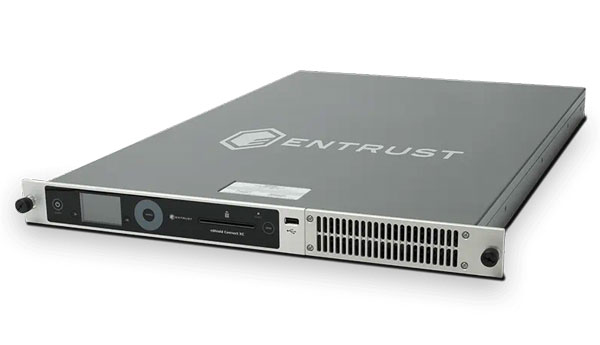
nShield HSMi
Certified hardware designed to deliver scalable cryptographic services for issuance software.

Integral for integrated issuance
The nShield Hardware Security Module (HSMi) is FIPS 140-2 Level 3-certified hardware that delivers cryptographic services for Entrust’s secure issuance software. This tamper-resistant HSMi performs vital functions for financial and identification issuance, including EMV data preparation, key generation, and data protection.
nShield HSMi Benefits
Seamless Integration
Our Security World architecture integrates our HSMi with issuance software, ensuring seamless failover and maximum availability.
High Transaction Rates
Its support for high transaction rates makes it ideal for instant issuance and central issuance.
Remote Administration
The Remote Administration kit facilitates remote smart card presentation for firmware updates and more.
Tech Specs
Supported Cryptographic Algorithms
Asymmetric algorithms: RSA, Diffie-Hellman, ECMQV, DSA, El-Gamal, KCDSA, ECDSA (including NIST, Brainpool & secp256k1 curves), ECDH, Edwards (Ed25519, Ed25519ph)
Symmetric algorithms: AES, Arcfour, ARIA, Camellia, CAST, DES, MD5 HMAC, RIPEMD160 HMAC, SEED, SHA-1 HMAC, SHA-224, HMAC, SHA-256 HMAC, SHA384 HMAC, SHA-512 HMAC, Tiger HMAC, Triple DES
Hash/message digest: MD5, SHA-1, SHA-2 (224, 256, 384, 512 bit), HAS-160, RIPEMD160
Supported Issuer EMV Certificates
- American Express
- Discover
- Elo
- Interac
- Japan Credit Bureau (JCB)
- Jetco
- MasterCard
- NSICCS Indonesia
- Visa
- VCCS Vietnam
Security Compliance
- FIPS 140-2 Level 2 and Level 3 certified
Host Connectivity
- Dual Gigabit Ethernet ports (two network segments)
Safety and Environmental Standards Compliance
- UL, CE, FCC, C-TICK, Canada ICES RoHS2, WEEE
High Availability
- Field-serviceable fan tray components
- Dual hot-swap power supply
- HSM load balancing / Failover with Adaptive Issuance Key Manager
Management and Monitoring
- nShield Remote Administration — includes nShield Trusted Verification
- Device and remote administration smart cards
Physical Characteristics
- Standard 1U 19in. rack mount dimensions: 43.4 x 430 x 705mm (1.7 x 16.9 x 27.8in)
- Weight: 11.5kg (25.4lb)
- Input voltage: 100-240V AC auto switching 50-60Hz
- Power consumption: up to 2.0A at 110V AC, 60Hz | 1.0A at 220V AC, 50Hz
- Heat dissipation: 327.6 to 362.0 BTU/hr. (full load)
Related Products




